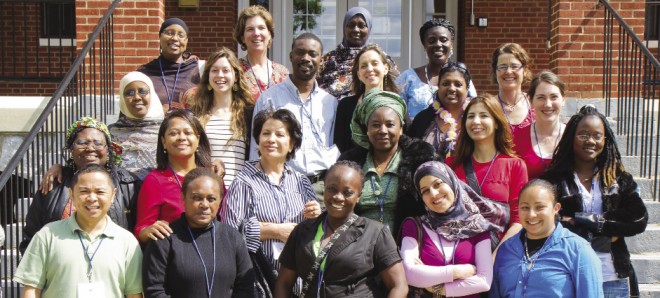
With a history of violence linked to colonization, intense poverty and vulnerable geographic location, Haiti has long suffered from natural disasters, social conflict, and other traumatic events.
That is one reason more than 12,000 Haitians have welcomed trainings, materials and principles of Wozo, a program derived from EMU’s Strategies for Trauma Awareness and Resilience (STAR).
“Wozo has helped me to know better ways to act and react when faced with conflict,” says Smith Rafael, director of a school in his home community of Wanament. “I live more nonviolently and help other people to do that too.” Rafael says he uses Wozo material in a radio show he hosts for two hours each Sunday evening (streamed via powerhaiti.com).
For Dieudonné, Wozo has been a vehicle for building self-esteem, both for himself, as a man with a deformed leg, and for Haitians generally, as citizens of a country dealing with a multitude of problems. “We need mental peace,” he says. “We are so traumatized by our history, our culture and the earthquake, we must find ways to be at peace mentally. As a society, we have lost our self-esteem.”
Dieudonné (who goes by this one name) has undergone six operations on one of his legs to correct a deformation since birth. He walks with the aid of crutches and is coordinator of the Association of Handicapped Persons for Northwest Haiti. “Prior to taking Wozo, I always had problems with accepting myself, the way I am. Now I accept myself as a person of value and know how far I can go. This has been the biggest change in myself.”
Wozo is basically STAR translated and contextualized for Haiti. STAR director Elaine Zook Barge and other project staff have taught trauma awareness and response skills to a core group of 1,000 volunteers, including Rafael and Dieudonné, many of whom are now putting the concepts to work in their own communities. Sixty-eight of these volunteers have completed the Level II STAR program, enabling them to train others.
Enthusiasm for the trainings – sponsored by six Christian organizations including Mennonite Central Committee (MCC) – demonstrates the profound need for trauma work in Haiti, as well as STAR’s relevance across cultures and contexts, say several people affiliated with the project.
“It is really a blessing. It is really amazing to have this kind of program in Haiti to contribute to the construction of human beings as well as the resilience of the Haitian people,” says Garly Michel, the Wozo coordinator. He oversees the trainings throughout the country.
The three-year project, now completing its final year, was launched in the aftermath of the 2010 earthquake that killed 316,000 and left 1.5 million homeless, according to Haitian government statistics. Ten months after the earthquake, a cholera epidemic occurred. Originally focused on the areas most affected by the earthquake, Michel says the project’s scope soon expanded to include all 10 départements, or states, in Haiti.
Barge notes that Haiti also is recovering from collective, historical trauma from the effects of slavery during the colonial era, racial discrimination, and structural violence, including external interventions that impose foreign interests.
“We’d like to see a nonviolent, healthy and resilient Haiti where each Haitian feels comfortable, safe and proud to live,” says Harry Thélusma, Wozo program officer.
Michel, Thélusma and 32 other Haitians are alumni of EMU’s Summer Peacebuilding Institute, where they have taken classes on a variety of topics, including humanitarian aid, leadership for healthy organizations, and monitoring, evaluation and learning.